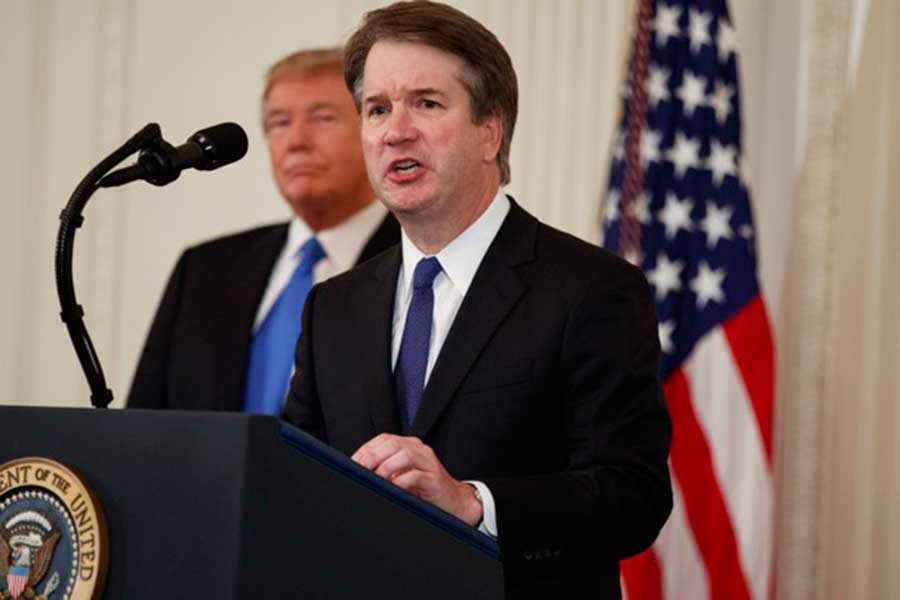President Trump nominated conservative judge Brett M. Kavanaugh to fill the vacant seat in the U.S. Supreme Court in a move that will likely threaten the rights of LGBTQ Americans, say advocates.
“It comes as no surprise that Kavanaugh was Trump’s pick. What’s more concerning is if he is confirmed, he will play a major role in rolling back our protections for LGBTQ people, possibly chipping away at the Affordable Care Act and disintegrate the Roe v. Wade decision,” said Stacey Long Simmons, director of advocacy and action for the Washington, D.C.-based National LGBTQ Task Force.
Kavanaugh, 53, a federal appeals-court judge in the District of Columbia, has a long history of conservative ties. The nominee served as a Supreme Court clerk for Justice Kennedy in 1993. He later became a prosecutor, working under Ken W. Starr, the independent counsel who investigated President Bill Clinton, and then as staff secretary to President George W. Bush.
On abortion-related issues, Kavanaugh wrote a dissenting opinion in 2017 about whether a pregnant 17-year-old being held by immigration authorities was allowed to leave custody to obtain an abortion. The court ruled with a Texas judge that the teenager was legally entitled to an abortion, while Kavanaugh dissented by requesting the government to release the girl to an adult sponsor. Kavanaugh was also backed by the anti-LGBTQ group Family Research Council.
Adrian Shanker, executive director of the Bradbury-Sullivan LGBT Community Center in Allentown, believes that, despite clerking for him, Kavanaugh will likely not emerge as a version of Justice Kennedy.
“LGBTQ Americans deserve a fair-minded court. Justice Kennedy was a fair-minded justice and the nominee that is likely to replace him doesn’t seem to share those values,” Shanker said. “Kavanaugh does not reflect Kennedy’s legacy, and the difference will be palpable. “It is important that we continue to advance LGBT progress at every level of government — from school boards to federal-policy change.”
Justin Robinette, a civil-rights lawyer based in Philadelphia, said the nominee “could be worse.”
“Kavanaugh worked as Kennedy’s clerk, and that may have a significant impact on how he handles cases he’s appointed. I think he could put a burden on abortion rights but I don’t believe that he will be responsible for reversing precedents such as Roe v. Wade,” Robinette said.
Judge Dan Anders, who is openly gay jand serves in Philadelphia’s First Judicial District, declined to comment on the nominee, but said any SCOTUS appointee “should respect the law and respect precedent.” Anders serves as the president of the International Association of LGBT Judges, which seeks to increase the visibility of LGBT jurists.
“When I ran 10 years ago as the first gay man to run for a public office, I felt that it was important that the public officials who are elected represent the full and rich diversities of the people that we represent,” he said. “President Obama was the first president to nominate openly gay attorneys to become openly gay judges. If we want to make people believe that the process is fair, decisions should be given out by a diverse group of judges.”
Despite being a conservative and nominated to the Supreme Court by a Republican president in 1987, Kennedy emerged as a swing vote in cases involving abortion, affirmative action, voting rights and gay rights. In 1996’s Romer v. Evans (decided 6-3), Kennedy invoked the 14th Amendment’s Equal Protection Clause to overturn a Colorado constitutional amendment that prohibited local jurisdictions from protecting LGBT people from discrimination based on sexual orientation. In 2013’s United States v. Windsor (5-4), Kennedy’s vote effectively ended the federal ban on marriage between same-sex partners and in 2015’s Obergefell v. Hodges (5-4), his was the deciding vote that struck down state bans on same-sex marriage. He is retiring at the end of the month.
Prior to Trump’s SCOTUS pick, Vanita Gupta, president and CEO of The Leadership Conference on Civil and Human Rights, told PGN that “many of our civil and human rights hang in the balance.”
“The Supreme Court is the last line of defense for our civil and human rights and it serves as a crucial check on the other branches of government. Especially at a time when so many rights and freedoms are under threat, it is crucial that Justice Kennedy’s successor be a fair-minded and independent jurist,” she said.
